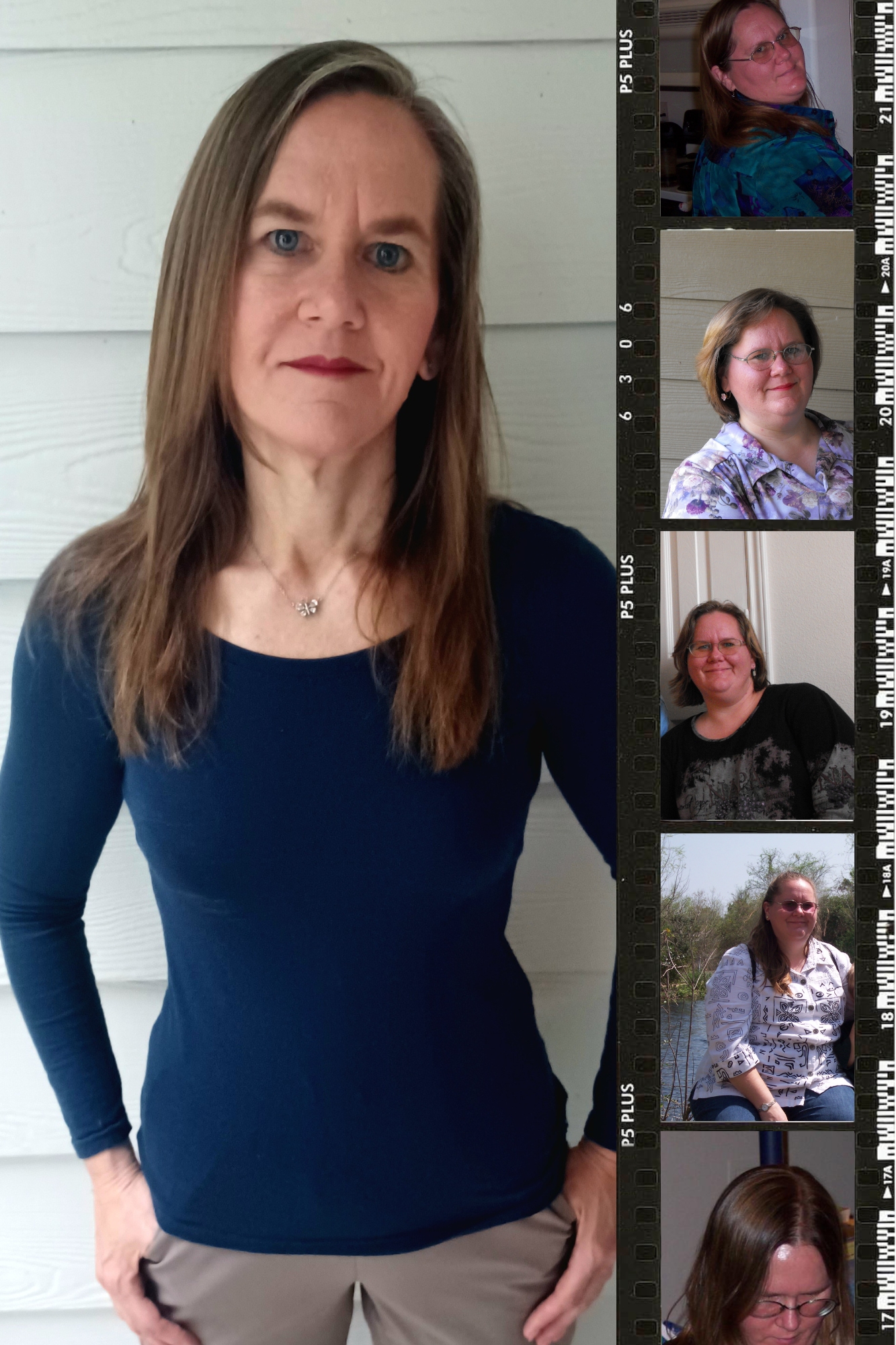
How Shifting My Mindset Made All the Difference
Filed in Body Image, Motivation — May 30, 2024
© - Content and images in this blog are copyright Katherine Beasley unless stated otherwise. Feel free to repost or share images for non-commercial purpose, but please make sure to link back to this website and its original post.
℗ - We do not store any information about your visit to our website other than for analytics and optimization for content and reading experience through the use of cookies.
℅ - Our site does at times contain paid advertisements, sponsored content, and/or affiliate links.
Walking Affirmations MP3
download
Download the free walking affirmations mp3 audio!
free resources
I'm on a mission to help ambitious women who feel trapped in their body weight have a successful weight loss journey.
I'm Katherine
Welcome to the Blog
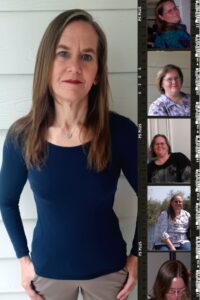
Excess Body Fat: Feeling Trapped and Searching for Solutions
Do you ever feel like no matter what you do, you’re stuck in a body that doesn’t reflect who you are inside? Eleven years ago, I felt imprisoned by my weight, fighting a losing battle despite my best efforts. Despite numerous attempts to shed those unwanted pounds, my success was fleeting, and maintaining any weight loss seemed impossible.
Frustrated and hopeless, I began to think that my genetics or health issues were to blame. I spent countless hours researching metabolic problems and diving deep into the labyrinth of supplement science. Every new pill, powder, or potion with bold claims of unlocking hidden metabolic secrets seemed like a beacon of hope. Yet, despite my dedication and the ever-growing pile of bottles cluttering my pantry, the elusive solution remained out of reach.
Weight Loss and Mindset
Looking back, I realize now that my obsession with supplements was merely a symptom of a much deeper issue—a misguided belief that weight loss could be reduced to a simple equation of calories in versus calories out. It wasn’t until I shifted my focus inward and began to explore the psychological barriers standing in my way that I truly began to make progress.
(As a side note, I did discover a number of supplements that I feel benefited my health, but that’s a subject for a different post. However, none of them really affected my weight or made weight loss any easier or more manageable.)
Mindset Over Methods for Losing Body Fat
In this blog post, I want to share with you the central insight that completely transformed my approach to weight loss and allowed me to finally break free. It’s a perspective that has revolutionized the way I think about health and wellness, and I believe it has the power to do the same for you.
If I were to try to boil it all down to one sentence, here’s how I would put it: The key to sustainable weight loss isn’t primarily about what you eat or how much you exercise—it’s about transforming your mindset and rebuilding your relationship with your body.
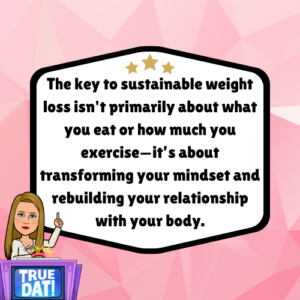
Weight Loss: Maintaining an Unstoppable Motivation
Of course, exercise and nutrition are important parts of weight loss. It’s not like you’ll lose weight if you keep eating exactly the same stuff and exercising (or not) at exactly the same level you are now. However, those are not the most important parts.
Put another way: if those are the only parts of the weight loss process you use, or the only parts you emphasize, I believe you are doomed to fail. To succeed, you need to develop a series of emotional, psychological, and metacognitive skills that will allow you to maintain an unstoppable motivation throughout a process that can be deemed unpleasant and challenging.
Examples of Skills You’ll Need
The skills you need to succeed include self-regulation, mental flexibility, adaptive behavior, and impulse control. These skills will help you see weight loss, exercise, and eating in a different light, allowing you to achieve the results you desire.
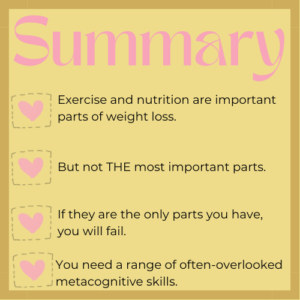
Weight Loss over 40: My Personal Journey to a New Life
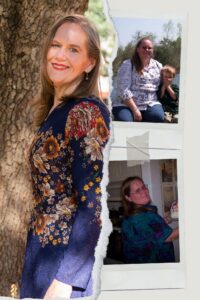
The results I’m talking about are the results I achieved. Eleven years ago, I weighed 280 pounds and wore a size 22. Now, I weigh 120 pounds and wear a size 2. It took about a year to lose that much weight, and I’ve kept it off for ten years now. I didn’t have weight loss surgery, didn’t use any weight loss drugs, and didn’t rely on any supplements, unusual diets, or special eating plans.
My life is so different now. Maintaining this weight does take some work, but it is no longer anything I would call difficult, and I no longer worry about going back to how I used to be.
Keeping Weight Off: Key Skills
Based on my experiences, both with my own weight loss journey and those of others I’ve helped, those emotional, psychological, and metacognitive skills I mentioned earlier are truly the key that helped me get where I am now. In my mind, these skills fall into four distinct categories:
- Letting Go of Internalized Weight Bias
- Learning Better Ways to Cope
- Turning Your Long-Term Goals into Daily Inspiration
- Figuring Out How to Stay on Track When Things Get Tough
Each of these deserves a blog post (or more) of its own. For today, I’ll just say a little about each one. These are also the skills that I cover in the course I’m creating. Sign up here to be notified when the course is available!
Letting Go of Internalized Weight Bias

In my opinion, “Letting Go of Internalized Weight Bias” is the single most important of these categories. The basic idea is simple: nobody wants to keep doing something that makes them feel unhappy, ashamed, or guilty.
By letting go of internalized weight bias, we can start learning other attitudes, mindsets, and behaviors that bring us joy, pride, and fulfillment. When your weight loss journey brings you feelings like that, it becomes so much easier to keep up your efforts. The idea of maintaining those efforts not just for the long term but for a lifetime suddenly seems not only possible but probable and even enjoyable.
What Research Says
Weight bias is a huge stigma in our society, and researchers have documented its intensity and harshness. For example, scientific research studies have shown that very young children consistently view heavy children as less desirable friends than children in wheelchairs or with missing limbs. This stigma is linked to unscientific myths, such as the belief that heavy people have “done that to themselves,” have less willpower, or indulge in vices rather than leading a life of virtue.
Why This is Vitally Important
Internalized weight stigma refers to accepting and believing these myths about ourselves. When a person holds these kinds of beliefs, it makes it nearly impossible to have a successful and long-lasting weight loss experience. You cannot punish yourself thin. Changing this one thing produces the largest single beneficial result.
Learning Better Ways to Cope

The myths I just discussed are not true facts about how excess weight comes about. They arise from unscientific folk beliefs about weight. In contrast, researchers have uncovered several actual causes and contributing factors for excess weight. One strong, consistent link is that between obesity and adverse childhood events, such as abuse, neglect, or other emotional trauma. For example, studies of people seeking weight-loss surgery found that about two-thirds had experienced at least one form of childhood abuse.
While the exact scientific mechanisms behind this link are not fully known, several common-sense responses seem effective in counteracting it:
- Seeking therapy or counseling services
- Improving mental health through self-help activities, such as books, blogs, or courses
- Developing healthy coping strategies and self-care activities
Turning Your Long-Term Goals into Daily Inspiration

This category of skills involves your library of life-hacks. Deciding to make a big change is easy; the hard part is translating that decision into daily actions. I often found myself forgetting in the moment that I was trying to start new behaviors and build new attitudes.
To live in my “big picture” motivation more in the moment, I developed various life-hacks. For example, I created a colorful poster listing all my “big-picture” motivations. If I didn’t want to get out of bed to jog, I at least had to get up, go out into the living room, and read the poster. After that, I was allowed to go back to bed if I wanted to. But surprise – I never ended up getting back in bed after reading it! Over the years, I developed a library of similar hacks to help me live the moments of my life more in alignment with my goals.
Figuring Out How to Stay on Track When Things Get Tough
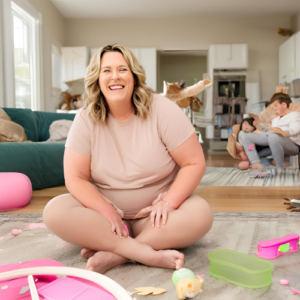
This skill set involves staying on course even when bad things happen. Many of us, especially survivors of trauma, have dysfunctional coping skills. An example would be comfort foods that we turn to when times get tough. While developing healthy coping skills is essential, dealing with setbacks or failures is also crucial.
What I’m saying here is true for any major lifestyle change, but it is especially true for starting a weight loss journey. Because if you’re like me and many others who struggle with excess weight, you may be a survivor of emotional trauma. This makes us more vulnerable to cognitive distortions like all-or-nothing thinking and catastrophizing. Things like that make setbacks and small lapses seem insurmountable and can really throw us off track.
Weight Setbacks and Plateaus: A Useful Strategy
In connection with weight setbacks and plateaus, I find the strategy of “defensive pessimism” useful. This involves hoping for the best but planning for the worst. Under this view, one takes the stance that setbacks are inevitable. That’s a logical thing to believe – nobody can change a habit or lifestyle instantly, after all! Instead of feeling bad about lapses, we can plan out ways to deal with them positively. These responses help build a new identity: that of a successful, healthy person experiencing a weight loss success story.
Conclusion
These elements of my approach to weight loss set me apart from most other weight loss coaches. I will never tell you to follow a specific diet or exercise plan. Those choices are personal. What’s important is finding joy and fulfillment in your weight loss journey and structuring it so you see yourself as the hero of your own story. Because once you do that, it’s a story you’ll want to continue writing for the rest of your life!
I am in the process of building an online course based on the philosophy outlined in this blog post. Sign up here to be notified when the course is ready! And as always, please scroll down and leave a comment. I’d love to connect with you!

Leave a Reply Cancel reply
"Harmonious Habits for Healthy Weight Management"
(coming soon!)
Online Course
One-on-one mindfulness coaching.
Individual Coaching
Inspire and fuel your weight loss journey with a monthly membership.
Monthly Membership
Captivating short headline
Services
Katherine :: BIO
Weight loss is a journey I've walked myself, starting 10 years ago. At 135 lbs., I now weigh less than half of my top weight (280 lbs.). People keep asking what my "secret" is. The truth is anyone can do it - you just have to add in the missing links of mindfulness and self-compassion.
Experience the power of mindfulness and self-compassion to totally revamp your workout experience. My guided walking affirmations will help you take your workout from burdensome to joyful. Get a download link to this inspiring and encouraging 23-minute MP3 sent directly to your inbox, completely free!
Free Guided Affirmations
leave a comment!
Comments